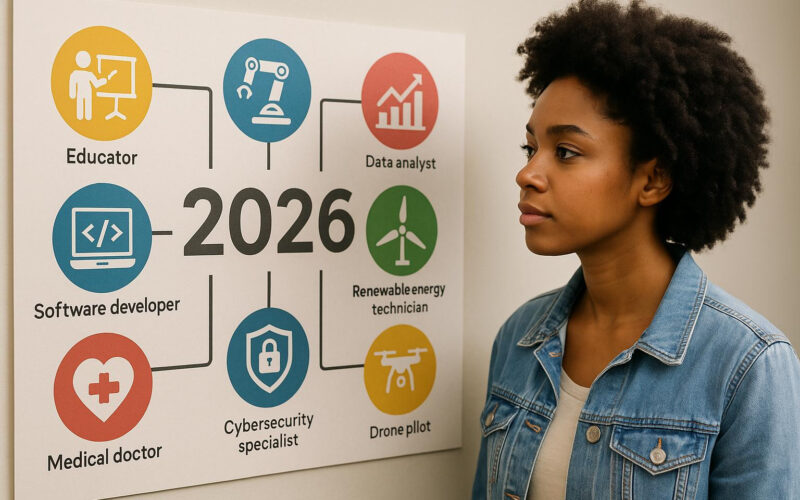Artificial Intelligence (AI) is no longer just a buzzword—it's becoming the backbone of how businesses operate, decisions are made, and careers evolve. Whether you’re a software developer, digital marketer, project manager, or even a teacher, gaining AI knowledge can give your career a major boost.
In this article, we’ll explore why learning AI is important for your career in 2026, what it means for professionals across industries, and how you can start building your AI skills today.
The Age of AI is Here
AI isn't coming—it's already here. From smart assistants to automated customer service and predictive analytics, AI is embedded in our daily lives and workplaces. And as tools like ChatGPT, Midjourney, and AI-powered analytics platforms continue to evolve, AI is reshaping the job market at a rapid pace.
A Look at the Trends
Here are a few reasons why learning AI is critical in 2026:
- Job automation is increasing: AI is automating repetitive tasks, which means human roles are shifting toward strategy, creativity, and leadership.
- AI skills are in demand: Companies in nearly every industry are seeking professionals with AI and machine learning expertise.
- Tech literacy is the new standard: Just like computers and the internet became must-haves in the workplace, AI fluency is set to become essential.
How AI Skills Can Strengthen Your Career
Adding AI to your skillset isn't just for data scientists. AI knowledge can benefit professionals in various ways, no matter their role.
1. It Future-Proofs Your Career
Learning AI helps you stay competitive in a world where technology is constantly changing. Jobs that didn’t exist a few years ago—like Prompt Engineer or AI Ethicist—are now in demand. By understanding AI concepts, you can adapt and stay relevant.
2. Opens Doors to High-Paying Roles
According to LinkedIn and Glassdoor job reports, roles involving AI and machine learning are among the fastest-growing and best-paying. Some of the top roles include:
- AI Engineer
- Machine Learning Specialist
- Data Scientist
- AI Product Manager
- AI Consultant
These roles are not limited to tech companies. Healthcare, finance, education, and retail are all embracing AI, creating new career opportunities.
3. Makes You a More Valuable Employee
Even if you’re not planning a career switch, understanding AI can make you better at your current job. For example:
- Marketers can use AI tools for advanced customer targeting.
- HR professionals can automate resume screening with AI.
- Project managers can apply AI for smarter resource planning.
- Teachers can personalize learning using AI-powered platforms.
The key takeaway? AI helps you work smarter, not harder.
AI is for Everyone – Not Just Tech Experts
You don’t need to have a Ph.D. in data science to learn AI. The beauty of today’s technology is accessibility. There are plenty of beginner-friendly courses, tutorials, and tools that help anyone get started with AI.
Easy Ways to Learn AI in 2026
- Online Courses: Platforms like Coursera, Udemy, and edX offer beginner to advanced AI courses.
- YouTube Videos: A great way to understand concepts visually and at your own pace.
- Books and Blogs: Follow thought leaders in AI to stay updated and inspired.
- AI Tools: Play around with tools like ChatGPT, DALL·E, or Google's AutoML to get hands-on experience.
Start with topics like:
- What is Artificial Intelligence?
- Basics of Machine Learning
- Natural Language Processing (NLP)
- Ethics in AI
Real-World Applications of AI in Careers
AI is not just a theoretical concept—it’s making a real impact in workplaces today.
Here are some real-life examples:
- Healthcare: AI helps in early disease detection with image recognition tools.
- Retail: AI-driven recommendation systems increase customer satisfaction.
- Finance: Fraud detection and algorithmic trading are increasingly AI-led.
- Education: AI tutors and learning platforms adapt to student needs in real time.
No matter your industry, understanding AI gives you a competitive edge.
AI and Soft Skills – A Winning Combo
While AI can handle data-heavy tasks, human skills like creativity, empathy, critical thinking, and emotional intelligence can’t be replicated easily. When you combine these soft skills with AI knowledge, you become a powerhouse in the modern workplace.
Employers are looking for people who can interpret data, make decisions, and communicate effectively. AI simply enhances your potential—not replace it.
What the Future Holds
By 2026, over 90% of global companies are expected to use some form of AI technology in their operations. As AI continues to evolve, so will the roles and skills required in most industries.
The good news? You still have time to prepare, learn, and lead. The sooner you start understanding AI, the more opportunities you'll unlock.
Final Thoughts: Start Small, Think Big
Learning AI may seem intimidating at first, but it’s more accessible than ever—and incredibly rewarding. Whether you want to change careers, level up in your current role, or simply stay ahead, embracing AI is a smart move for your future.
Ready to Step into the Future?
Don’t wait for the future to arrive—shape it. Start learning AI today, stay curious, and become a leader in your profession. Your 2026 self will thank you.
Want to take the first step? Subscribe to our newsletter for weekly AI learning tips and resources tailored to help you grow your career.









